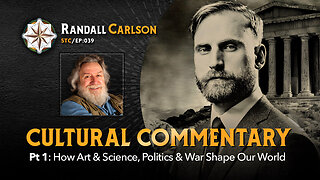Premium Only Content

HITLER'S WAR by David Irving, Author and Historian.
Against the insidious wiles of foreign influence (I conjure you to believe me, fellow-citizens) the jealousy of a free people ought to be constantly awake, since history and experience prove that foreign influence is one of the most baneful foes of republican government. But that jealousy to be useful must be impartial; else it becomes the instrument of the very influence to be avoided, instead of a defense against it. Excessive partiality for one foreign nation and excessive dislike of another cause those whom they actuate to see danger only on one side, and serve to veil and even second the arts of influence on the other. Real patriots who may resist the intrigues of the favorite are liable to become suspected and odious, while its tools and dupes usurp the applause and confidence of the people, to surrender their interests.
The great rule of conduct for us in regard to foreign nations is in extending our commercial relations, to have with them as little political connection as possible. So far as we have already formed engagements, let them be fulfilled with perfect good faith. Here let us stop. Europe has a set of primary interests which to us have none; or a very remote relation. Hence she must be engaged in frequent controversies, the causes of which are essentially foreign to our concerns. Hence, therefore, it must be unwise in us to implicate ourselves by artificial ties in the ordinary vicissitudes of her politics, or the ordinary combinations and collisions of her friendships or enmities.
Our detached and distant situation invites and enables us to pursue a different course. If we remain one people under an efficient government, the period is not far off when we may defy material injury from external annoyance; when we may take such an attitude as will cause the neutrality we may at any time resolve upon to be scrupulously respected; when belligerent nations, under the impossibility of making acquisitions upon us, will not lightly hazard the giving us provocation; when we may choose peace or war, as our interest, guided by justice, shall counsel.
Why forego the advantages of so peculiar a situation? Why quit our own to stand upon foreign ground? Why, by interweaving our destiny with that of any part of Europe, entangle our peace and prosperity in the toils of European ambition, rivalship, interest, humor or caprice? ( That there is no reason for the United States to abandon its own interests and get involved in the conflicts of other nations, essentially advocating for neutrality and avoiding foreign entanglements; it is better to stay focused on American affairs rather than taking sides in European disputes.
Key points about this phrase:
Washington's message:
By using this phrase, Washington was warning against forming alliances or taking sides in foreign wars, emphasizing the importance of maintaining American independence and neutrality. )
It is our true policy to steer clear of permanent alliances with any portion of the foreign world; so far, I mean, as we are now at liberty to do it; for let me not be understood as capable of patronizing infidelity to existing engagements. I hold the maxim no less applicable to public than to private affairs, that honesty is always the best policy. I repeat it, therefore, let those engagements be observed in their genuine sense. But, in my opinion, it is unnecessary and would be unwise to extend them. . . .
Excerpt from George Washington's Farewell Address September 19th 1796
-
 1:07:25
1:07:25
Bloodlines
12 days agoTHE SEVENTH SEAL OF JUDGEMENT by Dr. James P. Wickstrom, Teacher of YAHWEH
3152 -
 LIVE
LIVE
Vigilant News Network
12 hours agoBombshell Study Reveals Where the COVID Vaccine Deaths Are Hiding | Media Blackout
1,797 watching -
 1:17:59
1:17:59
Sarah Westall
8 hours agoDOGE: Crime & Hysteria bringing the Critics & the Fearful - Plus new CDC/Ukraine Crime w/ Dr Fleming
36.6K3 -
 45:39
45:39
Survive History
14 hours ago $6.95 earnedCould You Survive in the Shield Wall at the Battle of Hastings?
51K6 -
 1:50:28
1:50:28
TheDozenPodcast
13 hours agoViolence, Abuse, Jail, Reform: Michael Maisey
90.7K4 -
 23:01
23:01
Mrgunsngear
1 day ago $5.28 earnedWolfpack Armory AW15 MK5 AR-15 Review 🇺🇸
78.5K12 -
 25:59
25:59
TampaAerialMedia
1 day ago $3.15 earnedUpdate ANNA MARIA ISLAND 2025
49.1K4 -
 59:31
59:31
Squaring The Circle, A Randall Carlson Podcast
15 hours ago#039: How Politics & War, Art & Science Shape Our World; A Cultural Commentary From Randall Carlson
37.6K3 -
 13:21
13:21
Misha Petrov
15 hours agoThe CRINGIEST Thing I Have Ever Seen…
30K56 -
 11:45
11:45
BIG NEM
11 hours agoWe Blind Taste Tested the Best Jollof in Toronto 🇳🇬🇬🇭
21.1K1